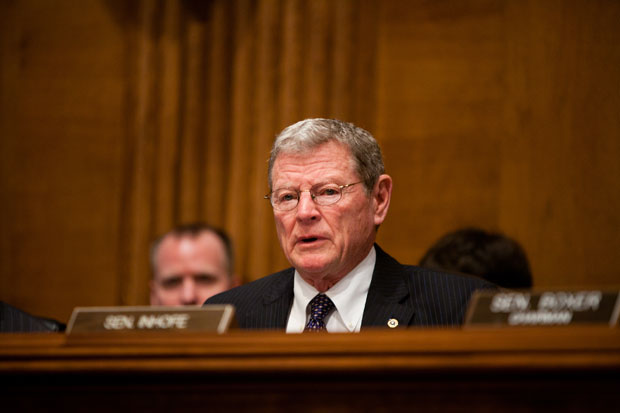
Sen. James Inhofe, R-Oklahoma
Brendan Hoffman / Getty Images


Sen. James Inhofe, R-Oklahoma
Brendan Hoffman / Getty Images
A rare joint Congressional hearing in Washington Wednesday took up the issue of “Waters of the United States,” the U.S. Environmental Protection Agency’s attempt to more clearly define which bodies of water qualify for federal protection under the Clean Water Act.
Republicans at the hearing — including Oklahoma’s senior senator and state attorney general — are convinced the move is a vast overreach of the EPA’s power that will place everything from ditches to farm ponds under government control.
Administrator Gina McCarthy explained the EPA’s action as a benign clarification of existing rules meant to reduce confusion for farmers and ranchers, not further burden them.
Senator Jim Inhofe wasn’t buying it.
“Agencies can only carry out the authority that Congress gives them. They can’t create it unilaterally, and that’s what I believe is happening now,” Inhofe said in his opening remarks.
Later, Oklahoma Attorney General Scott Pruitt weighed in, vowing a lawsuit if the rules are finalized in their current form. Watch the exchange below:
“To Administrator McCarthy, who appeared before you today, I say forgive the skepticism of the states,” Pruitt said. “These reassurances are from the same administration that said ‘if you like your health insurance you can keep your health insurance.’”
In September, J.D. Strong with the Oklahoma Water Resources Board told StateImpact he doesn’t make a habit of bashing the EPA, and some clarification would be nice, but that this proposed rule doesn’t do it.
StateImpact also spoke with the EPA Water Office’s Ken Kopocis for that September 2014 story, who said farmers’ fears are unfounded, that most of their activities would be exempt from the rule, and that the proposed rule actually includes fewer waterways than are currently under federal control.
This all stems from U.S. Supreme Court rulings in the early to mid-2000s:
It’s never been entirely clear which waterways are ‘waters of the U.S.’ and get Clean Water Act protections. The current definition includes any waterway that, if polluted, would have a negative impact on interstate commerce.
…But U.S. Supreme Court justices in 2001 and 2006 said that’s not a good enough test. That’s why EPA is proposing a new one.
…Kopocis says the new rules take into account the interconnected nature of waterways. He says, for example, you can’t protect water in a river without fixing the pollution that comes in from its tributaries or adjacent wetlands.
The EPA expects to finalize the rule this spring.